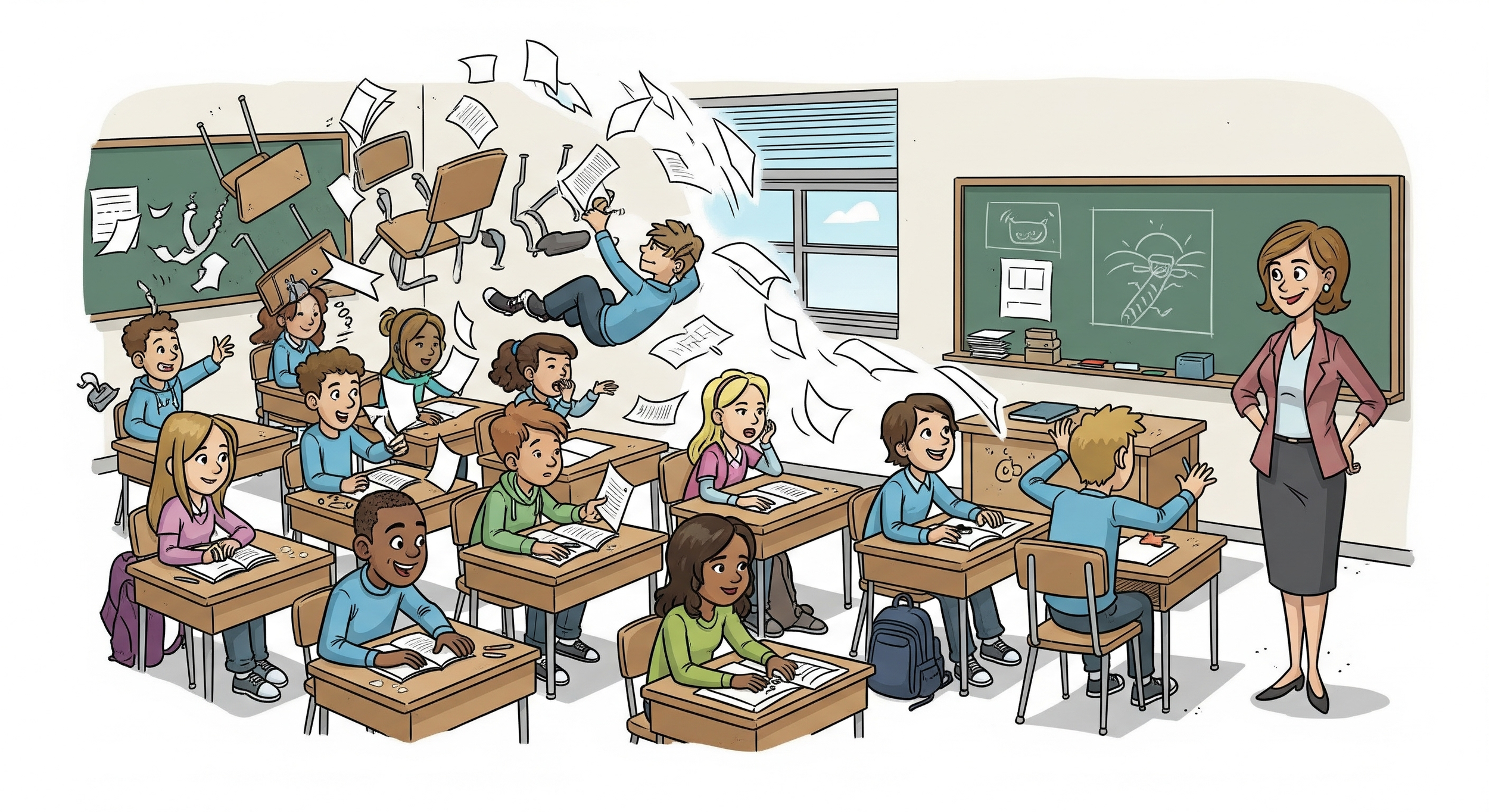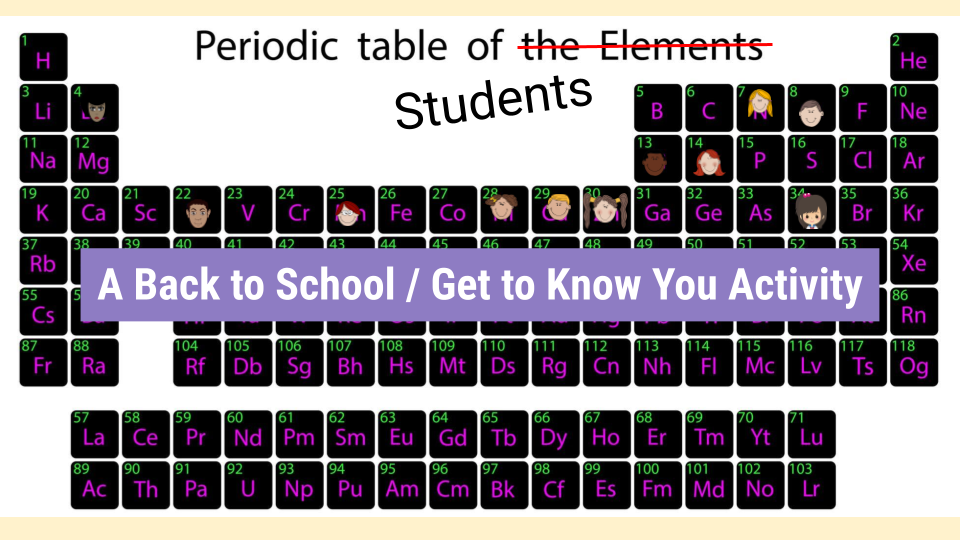Why Classroom Management Is Just a Fancy Word for Keeping Them Busy
Let's be brutally honest, my teacher brethren. The holy grail of teaching isn't perfect lesson plans and groundbreaking pedagogical theories. No, it's the mythical monster of the classroom management variety.
Think about it.
We spend countless hours practicing our teacher look in front of the mirror, come up with ways to be proactive rather than reactive, and, if these preemptive strikes don’t work, devising elaborate consequence systems.
But maybe the secret isn't more rules. Maybe, just maybe, getting them to want to be there is the key. Maybe the ultimate classroom management strategy isn't about control, but making our students so utterly engrossed they forget they have phones, mouths, or a burning desire to ask if they can go to the bathroom.
Revolutionary ain’t it? Engaged students are busy students, and busy students are, by definition, not playing Brawl Stars on their phones instead of doing that one assignment or staging a dramatic re-enactment of that TikTok dance that went viral yesterday. When their brains are buzzing with curiosity, there's simply no bandwidth left for shenanigans. So, ditch the stern voice (like 93% of the time) and embrace the art of the creative, captivating curriculum. Your sanity and your classroom furniture will thank you.
5 Lesson Designs that Trick Your Students into Learning (aka How to Survive and Prevent Classroom Destruction)
Here are five cunning lesson strategies designed to suck your students into the learning vortex, leaving no room for mischief.
The Great Debate: Intellectual Thunderdome Edition
Pick a controversial topic relevant to your subject – perhaps the ethics of genetic engineering, the best solution for climate change (with actual scientific backing, obviously), or the merits of different historical figures. Assign roles, provide research materials, and let them duke it out. The sheer competitive energy and the need to sound smarter than their peers will keep them laser-focused. Just remember to set ground rules for actual "decorum," because while intellectual sparring is encouraged, throwing textbooks is generally frowned upon.
Escape Room: The Academic Edition
Transform your classroom into a themed escape room where every puzzle requires knowledge from your current unit. Students work in teams to unlock clues, solve riddles, and complete challenges that reinforce concepts and skills. The ticking clock and the promise of "escaping" (or at least getting bragging rights) is a powerful motivator. If they're too busy deciphering codes based on gas laws, they won't even notice their phone is still in their pocket. Bonus points if the final clue leads them to the bell.
The "Shark Tank" Innovation Challenge
Assign a real-world problem (e.g., how to solve local water pollution, design a sustainable city, or create a new recycling method). Students, working in groups, must research, brainstorm, design a solution, and then "pitch" their innovative idea to a panel of "investors" (you, a colleague, or even local community members). The competitive drive to create the most viable and impressive project will channel all their boundless energy into productive, creative output. Plus, the promise of an “investment" (extra credit for the winners, perhaps?) keeps them surprisingly compliant.
Gamified Learning Journey (with Leaderboards, Obviously)
Turn your unit into an epic quest! Break down content into smaller "levels," each with a specific learning objective and a clear "challenge" (quiz, mini-project, collaborative task). Use a simple points system and a visible leaderboard (because nothing motivates teenagers like public recognition of their superiority). Incorporate short, engaging online games (yes, like Kahoot or Quizlet, but maybe also some more complex simulations such as Minecraft) as "side quests." When they're trying to outscore their friends on a photosynthesis quiz, they don't have time to doodle inappropriate images on their desks.
Check out Matt Miller's Teach with Kahoot! blog post that explains how to use Kahoot! to not just review but deliver new instruction in a fun way and, if you teach chem, grab my Specific Heat Blind Kahoot! (free) to help your students both review the previous and learn some new stuff.
The CSI-style Classroom Mystery Investigations
Forget boring worksheets! Present your students with a compelling, open-ended problem that mirrors a real-world scenario. Maybe it's a mysterious event that led to puddles forming in the parking lot when it has not rained all week that requires them to apply scientific principles to deduce the culprit (dew, but not of the mountain variety). Provide evidence (case files with data, clues, bizarre notes) they must analyze, collaborating in small groups to piece together the truth. When they're arguing passionately about the spectral analysis of an unknown cosmic event, they're not arguing about who cooked and who sold during the football game last week.
And, yes, you'll be sacrificing some sleep and possibly your sanity during the setup phase of a learning experience of the CSI variety. But when you see your students transform into mini-forensic SEP (science and engineering practices) user experts, their brains buzzing with newfound investigative and critical skills, and a deep mastery of the universe, or at least the content, you'll know it was all worth it. Besides, who doesn't love a good mystery, even if the "victim" is just a cleverly disguised gummy bear?
If you don’t mind getting down and dirty, check out my next post on Making Lessons Fun the CSI-style: Classroom Mystery Investigations
But if you like your sleep, enjoy your general lack of crazy, teach Earth Science, and don’t mind spending three bucks, grab my Cosmic Scene Investigation Case, a lesson in which students examine and analyze 5 case files of data collected by various astronomical instruments (mostly various telescopes), which provide them with just enough data to investigate and (hopefully) correctly identify the cosmic event (kilonova) that led to the creation of these data files, aliens not included. Sorry!
So…
there you have it. The real secret to classroom management doesn’t involve waving a magic wand and exclaiming Imperio, Crucio, or Avada Kedavra - though you frequently want to. It's simply designing lessons so crazily compelling that your students forget they're even in school.
Okay, that may be a stretch. But still, you are already spending time devising lessons, ain’t ya? So instead of the tyrraditional (totally a word), mind numbing, sit and get stuff, look for ways to do it so your students are too busy learning, collaborating, and dominating their peers (‘cause it’s all about the dub) to ever consider causing mayhem. You're welcome.
Thanks for reading my thoughts! I hope they help. If you need thoughtful, engaging, and phenomena-based (the whole NGSS thing) Earth and Space Science or Chemistry lessons. I keep the prices decent, but if you cannot spare the $, please email me and I’ll give you whatever you need for free.
BOOKS & TOOLS
- July 2025 2
- June 2025 2
- August 2024 2
- July 2024 2
- June 2024 1
- October 2023 1
- September 2023 3
- August 2023 6
- July 2023 6
- July 2022 2
- June 2022 1
- November 2020 3
- October 2020 3
- April 2020 1
- March 2020 5
- July 2019 1
- June 2019 1
- April 2019 1
- January 2019 1
- November 2018 3
- October 2018 2
- September 2018 1
- August 2018 8
- July 2018 11
- June 2018 4
- May 2018 5
- April 2018 2
- March 2018 4
- February 2018 5
- January 2018 3
- December 2017 1
- November 2017 5
- October 2017 7
- September 2017 6
- August 2017 5
- July 2017 3
- June 2017 10
- May 2017 7
- April 2017 7
- March 2017 15
- February 2017 12
- January 2017 13
- December 2016 15
- November 2016 8
- October 2016 7
- September 2016 12
- August 2016 14
- July 2016 10
- June 2016 13
- May 2016 10
- April 2016 8
- March 2016 5
- February 2016 7
- January 2016 6
- December 2015 5
- November 2015 8
- October 2015 2











![[Earth & Space Science] Cosmic Scene Investigation: A Case of the Kilonova](https://images.squarespace-cdn.com/content/v1/5611dbcce4b0b27692201460/af009c00-4e48-4f80-a91c-3a7899d66828/Cosmic+Scene+Investigation_+A+Case+of+the+Kilonova.png)


